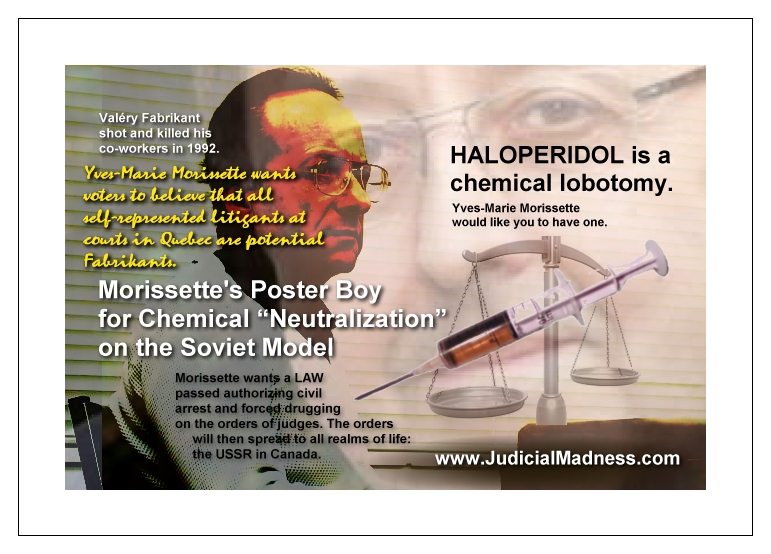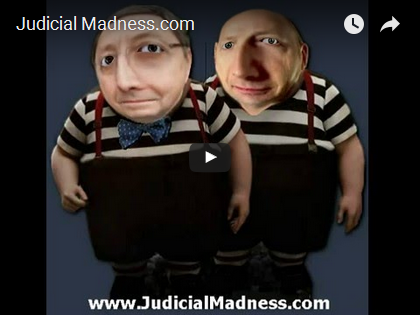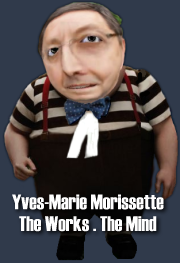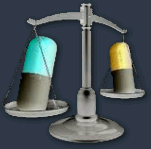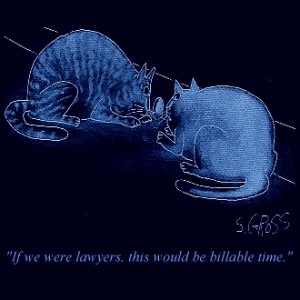Les quérulents : la hantise de nos tribunaux / The Querulents: our courts are in fear of them by Charles Meunier
Les quérulents :
la hantise de nos tribunaux
The Querulents: our courts are in fear of them
|
Les quérulents : la hantise de nos tribunaux |
The Querulents : our courts are in fear of them |
|
Charles Meunier |
Charles Meunier |
|
La politique a ses mégalomanes, la médecine ses hypocondriaques et le droit ses quérulents. Ils engorgent et paralysent les tribunaux où ils sévissent. Ils font peur. Leurs comportements extravagants et irrationnels ont le don de déstabiliser le personnel d’une cour de justice. Les plus optimistes de leurs victimes regrettent amèrement de s’être trouvées sur leur route. En découdre avec eux lors d’un procès peut, en effet, s’étendre sur des années et conduire à la faillite personnelle. Le monde du droit les appellent « plaideurs vexatoires » et celui de la psychiatrie, « quérulents ». |
Politics has its megalomaniacs, medicine its hypochondriacs and the law its querulents. They clog and paralyze the courts where they prevail. They sow fear. Their extravagant and irrational behaviors have the gift of destabilizing the personnel of a court of justice. The most optimistic of their victims bitterly regrets being found on their path. A stitch-up with them during a lawsuit can, indeed, extend over years and lead to personal bankruptcy. The world of law calls them “vexatious litigants” and that of psychiatry, “querulents”. |
|
Devoir affronter un quérulent est une expérience traumatisante. Peu importe sa cible, l’objectif est toujours le même : obtenir réparation après avoir été victime d’une soi-disant injustice. Chicane de clôture, plainte pour discrimination et diffamation ne sont que quelques exemples des motifs de poursuite invoqués devant les tribunaux. Pas question de s’entendre hors-cours, la plainte doit aller jusqu’au bout. C’est une question de principe, rarement d’argent. Un quérulent ne lâchera pas prise à moins de gagner ou de faire faillite. Ses victoires se comptent sur les doigts d’une main, mais celles-ci le conforte dans ses agissements. En temps normal, neuf contentieux sur dix prennent fin avant d’atteindre le stade final d’une audience. Les parties en viennent à se raisonner plutôt que de s’acharner. « Mieux vaut un mauvais règlement qu’un bon procès, car on ne sait jamais où cela peut mener. Les quérulents, eux, ne voient pas les choses ainsi », de dire Me Yves-Marie Morissette, professeur titulaire à la Faculté de droit de l’Université McGill et auteur de publications sur la quérulence. Les effets pervers de cette pathologie sont nombreux. Les personnes atteintes peuvent transformer un tribunal en véritable foire par leurs comportements excentriques et démesurés. Sans compter les dépenses de temps et d’argent qu’ils engendrent, le tout aux frais des contribuables. |
Having to confront a querulent is a traumatizing experience. Notwithstanding his target, the objective is always the same: obtain reparation for having been the victim of a so-called injustice. A closing squabble, a complaint for discrimination and defamation are only some of the examples of the grounds for pursuit invoked before the courts. There is no question of settling out of court, the complaint must go the limit. It is a question of principle, rarely of money. A querulent will not let go unless he wins or declares bankruptcy. He counts his victories on the fingers of one hand, but these encourage him in his doings. In normal circumstances, nine out of ten disputes are over before the final stage of a hearing is reached. The parties come to reason with each other rather than to be at odds with each other. “Better a bad settlement than a good trial, because one never knows how that can turn out. The querulents do not see things this way”, according to Maître Yves-Marie Morissette, a full professor at the Faculty of Law of McGill University and the author of publications on quarrelsomeness. The perverse effects of this pathology are numerous. Those afflicted can transform a court into a veritable circus by their eccentric and disproportionate behaviours. Not to mention the expenditures in time and money that they engender, all at the cost of the taxpayers. |
|
Des comportements compulsifs |
Compulsive |
|
Michel S… réussit avec brio son test en vue de décrocher un poste d’économiste dans un ministère. Il fait cependant moins bonne figure lors de l’entrevue qui suit, compte tenu de son manque d’expérience pratique. On lui préfère un des deux autres candidats également en lice. Il n’en faut pas plus |
Michel S… passed his test with flying colors for the position of an economist in a ministry. However, he presented a less adept profile during the interview which followed, considering his lack of practical experience. One of the two other candidates in line was preferred to him. Nothing more was required |
|
|
|
|
pour qu’il s’imagine être victime de discrimination raciale. Michel poursuit dès lors le ministère qui ne l’a pas embauché et porte plainte au Tribunal canadien des droits de la personne et à la Commission canadienne des droits de la personne. Les deux organismes rejettent ses doléances. Convaincu d’être traité injustement, Michel poursuit le Tribunal et la Commission. Entre-temps, il intente un recours contre la commission de transport d’une grande ville canadienne pour une injure raciste dont il aurait été victime à bord d’un autobus. L’argent vient à manquer pour financer cette pléthore de procès. Afin de l’aider, il s’adresse au Fonds d’aide aux recours d’intérêt public. Le Fonds ne peut cependant lui donner un sous, sa mission étant de financer les recours collectifs d’ordre constitutionnels. Qu’à cela ne tienne, il porte plainte devant un tribunal contre le Fonds. |
for him to believe himself a victim of racial discrimination. Michel consequently sued the ministry which had not hired him and lodged a complaint with the Canadian Human Rights Court and with the Canadian Human Rights Commission. The two organizations dismissed his complaints. Convinced he was being treated unjustly, Michel sued the Court and the Commission. In the meantime, he filed a case against the transport commission of a major Canadian city for a racist slur which he suffered aboard a bus. The money suddenly dried up to finance this plethora of lawsuits. He asked the Public Interest Legal Assistance Fund to help him. The Fund however could not offer him a cent, its mission being to finance constitutional class actions. No problem, he filed a complaint before the Court against the Fund. |
|
Même des avocats sont devenus quérulents. À preuve, ce professeur de droit adressant, avec un acharnement hors du commun et sur une longue période, un éventail de récriminations au responsable de la conciergerie de l’immeuble où il habite. Récriminations qu’il mènera d’ailleurs jusqu’à la Régie du logement. Celle-ci balaiera du revers de la main toutes les plaintes, après analyse, les qualifiant de farfelues. Insatisfait, il transportera sa hargne à la cour du Québec. Le juge mandaté pour étudier la requête est désemparé par son comportement belliqueux et démesuré. Il rejette lui aussi toutes les plaintes. |
Even lawyers have become querulents. As proof, this law professor who with uncommon ferocity and over a long period of time, addressed a panoply of recriminations to the janitorial service in charge of the building where he lived. Recriminations which he moreover took as far as the Rental Board. Which dismissed all the complaints, hands-down, upon analysis, calling them far-fetched. Dissatisfied, he transported his aggressiveness to the Court of Quebec. The judge assigned to study the motion was bewildered by his quarrelsome and disproportionate behavior. He too dismissed all the complaints. |
|
D’autres avocats ont été radiés du Barreau québécois pendant quelques années pour érotomanie, pathologie caractérisée par des obsessions. L’un d’entre eux développe cette pathologie après avoir été radié à vie. Comme il se met à poursuivre tout ce qui bouge, une injonction est émise contre lui. Dorénavant, toute nouvelle poursuite de sa part doit obtenir l’aval d’un juge. Il ne peut ni porter plainte au Barreau ni à la police. On lui interdit également de téléphoner au domicile de ses victimes ou de leur envoyer des Subpœnas. « La quérulence peut aller jusqu’à ces niveaux de délire », explique Me Yves Marie Morissette. |
Other lawyers have been radiated from the Quebec Bar for several years due to erotomania, a pathology characterized by obsessions. One of them developed this pathology after being radiated for life. Since he contrived to sue anything that moved, an injunction was issued against him. Thereafter, any new proceeding of his had first to be approved by a judge. He could not lodge a complaint with the Bar, or with Police. He was also prohibited from telephoning the homes of his victims or sending them Subpœnas. “Quarrelsomeness can attain these heights of delirium,” explains Maître Yves Marie Morissette |
|
En général, les quérulents correspondent au profil d’une personne normale, très ordonnée et dont l’intelligence est souvent supérieure à la moyenne. Ils ont entre 40 et 60 ans et font partie de la classe moyenne. Une de leurs caractéristiques est de se représenter seuls en cour (ce qui ne veut pas dire pour autant que tous les justiciables non représentés soient d’emblée quérulents), compliquant ainsi, et de beaucoup, la tâche du tribunal. « S’ils se défendent seuls, c’est qu’ils en sont rendus là, ils n’ont plus le choix », d’ajouter Me Morissette. Le quérulent se met tout le monde à dos, y compris ses propres avocats qu’il collectionne à un rythme effarant. Plusieurs d’entre eux ont d’ailleurs été poursuivis par des clients quérulents. Ceux-ci n’aiment pas qu’on leur dise qu’ils ont tort d’intenter tel ou tel recours judiciaire. Les quérulents ont toujours raison. Plus on les contrarie, plus leur sentiment d’avoir été traité injustement grandit. Cela entraîne, dans les cas extrêmes, une surenchère de recours judiciaires en arborescence. |
In general, querulents correspond to the profile of a normal person, very orderly, and whose intelligence is often above average. They are between the ages of 40 and 60 and belong to the middle class. One of their characteristics is that they represent themselves in Court (which is not at all to say that all non-represented parties are necessarily querulents), thus considerably complicating the task of the court. “If they defend themselves alone, it is because they have got to that point, they have no more choice“, adds Maître Morissette. The querulent puts everyone on their backs, including his own lawyers whom he collects at a mind-boggling rhythm. Some of them have moreover been sued by querulent clients. Who do not like to be told that they are wrong to institute such and such an action. Querulents are always right. The more one contradicts them, the more their feeling grows of having been treated unjustly. This entails, in extreme cases, an expanding overdrive of legal recourses. |
|
Un esprit querelleur |
The mind of a quarreler |
|
Le dictionnaire usuel définit cette pathologie comme une tendance morbide à rechercher les querelles et à revendiquer des droits imaginaires, caractéristique de certaines psychoses. La quérulence serait également une tendance pathologique à se plaindre d’injustices dont on se croit victime. |
The standard dictionary defines this pathology as a morbid tendency to seek quarrels and to assert imaginary rights, characteristic of certain psychoses. Quarrelsomeness would also be a pathological tendency to complain about injustices of which one believes himself to be the victim. |
|
« En prenant conscience du vide qu’il crée autour de lui, le quérulent peut commencer à changer »
|
“In becoming
|
|
Symptôme de maladie mentale reconnue dans certaines classifications, la quérulence entre dans la catégorie « ego syntone », ce qui signifie que le quérulent ne se rend pas compte de son problème. Selon lui, cela fait partie de lui-même. « S’il consulte un spécialiste, ce qui est rare, on préconisera un médicament anti-psychotique en cas de délire ou une thérapie s’il s’agit d’un trouble de personnalité. Cette thérapie, de type cognitive, consiste à lui faire comprendre les conséquences de ses excès. En prenant conscience du vide qu’il crée autour de lui, le quérulent peut commencer à changer ». explique le psychiatre Gilbert Pinard. Si la pathologie persiste, par contre, elle peut conduire à un divorce, à de multiples conflits exacerbés entre voisins, des membres de la famille ou des proches amis. |
A symptom of mental illness recognized in some classifications, quarrelsomeness falls into the “ego syntonic” category, which means that the querulent is not aware of his problem. He believes it is a part of himself. If he consults a specialist, which is rare, an antipsychotic medication is recommended in case of delirium, or therapy if it’s a question of a personality disorder. This therapy, of the cognitive type, consists in making him understand the consequences of his excesses. “In becoming aware of the vacuum he is creating around himself, the querulent can start to change”, explains the psychiatre Gilbert Pinard. If the pathology persists, however, it can lead to a divorce, to multiple aggravated conflicts with neighbours, with family members or close friends. |
|
« Il peut s’agir d’une forme de paranoïa s’il y a présence d’un délire. Ce même délire peut également être associé à des troubles de la personnalité. Par exemple, la personnalité paranoïde, narcissique et, dans certains cas, celle de type « borderline. » Parfois, le quérulent est un paranoïde souffrant de troubles délirants en bonne et due forme. Ses croyances sont disproportionnées par rapport à la réalité et ses incessantes croisades judiciaires sont issues d’un délire imaginaire. En somme, les quérulents sont des personnes à l’affût de tout indice pouvant confirmer leurs thèses fondées sur la pensée paranoïaque. » |
“It may be a question of a form of paranoia if delirium is present. This same delirium can also be associated with personality disorders. For example, the narcissistic paranoid personality, and in certain cases, the “borderline” type. On occasion, the querulent is a paranoid suffering from delirium in good and due form. His beliefs are disproportionate with respect to reality and his incessant judicial crusades are the product of a delirious imagination. In sum, querulents are persons [[[ à l’affût de tout indice ]]] capable of confirming their theories founded on their paranoid thought.” |
|
Le Dr Pinard raconte l’histoire d’un patient dont la personnalité est devenue paranoïde à la suite d’un accident de travail. Après s’être écrasé l’index de la main droite sous une presse et avoir subi un choc post-traumatique, il reçoit une com- |
Dr. Pinard tells the story of a patient whose personality became paranoid after an accident at work. After crushing the index finger of his right hand under a press, and having suffered a post-traumatic shock, he received financial compensation and took some time off on sick leave to recover. On returning to work, he ws convinced that his boss was deliberately exposing him to a dangerous machine. He thus requested an extension of his sick leave. The employer refused. The patient then turned to the Commission de la santé et de la sécurité au travail (CSST) where he obtained the same result. As a last resort, he contacted his insurance company. Once again, his demand was rejected. |
|
Phénomène social en pleine croissance? « Je n’irais pas jusqu’à dire ça », affirme Me Morissette. N’empêche, la situation est préoccupante et l’onde de choc parmi la confrérie du droit n’est pas négligeable. Selon les chiffres avancés par Me Morrissette, il y aurait quelques centaines de quérulents non diagnostiqués au Québec, dont 150 actifs devant les tribunaux. Rien qu’à la Cour supérieure du Québec, une cinquantaine d’entre eux sévissent actuellement. « Il y en a certainement d’autres ailleurs, par exemple, à la Cour du Québec, devant les tribunaux administratifs et les tribunaux de compétence pénale. » |
A social phenomenon on the rise? “I wouldn’t go as far as to say that,” affirms Maître Morissette. Nonetheless, the situation is alarming, and the shock wave among the jurists is not negligible. According to figures advanced by Maître Morrissette, there would be a few hundred non-diagnosed querulents in Quebec, of whom 150 are actively before the courts. At Quebec Superior Court alone, some fifty of them are currently engaged. “There are certainly others, for example, at the Court of Quebec, before the administrative tribunals and the courts of penal jurisdiction.” |
|
Depuis le début de l’année 2001, la jurisprudence québécoise a publié une trentaine de cas au com- |
Since the start of the year 2001, Quebec jurisprudence has published some thirty cases of non-diagnosed querulent conduct. In this area, even so, Canada is far from having the worst case load. According to Richard A. Posner, author of the book The Problematics of Moral and Legal Theory, “it is hardly contested that the United States is a much more litigious society than many others”. Indeed, the proportion of law suits for civil liability per capita is three times higher among our neighbours to the south, than in England, for example. |
|
Les Britanniques ont bien tenté,en 1994, de s’attaquer à la problématique des justiciables non représentés. Dans un extrait du rapport Lord Wolf, entamé en 1999, on y mentionne que « trop souvent, le justiciable non représenté est perçu comme un cas à problème par les juges et l’appareil judiciaire en général. La personne devrait plutôt avoir le sentiment que la justice est |
In 1994, the British made an effort to tackle the problem of non-represented litigants. In an extract of a report by Lord Wolf, undertaken in 1999, it is mentioned that “too often, the non-represented party is perceived as a problem case by the judicial apparatus in general. One ought rather to have the feeling that justice is there to serve. In fact, the real problem lies at the level of legal procedures, still too often inaccessible and incomprehensible for the common mortal”. A series of measures has thus been adopted including the Civil Procedure Rules, the creation of legal information kiosks, and a remarkably innovative use of information technologies, systematic recourse to mediation as well as other regimes for the resolution of disputes and the setting up of Community Legal Services. “But the more you make the legal system accessible, the more you risk finding yourself with cases of querulence“, continues Maître Morissette. The problem thus remains. |
|
Un antidote |
An antidote |
|
Pour contrer les plaideurs abusifs, la justice québécoise les oblige, depuis 1994, à demander à un juge la permission d’intenter toute nouvelle poursuite devant les tribunaux. Mais cela ne fait que déplacer le problème. En fait, la justice québécoise est bien mal nantie pour se prémunir contre une inflation de recours judiciaires provenant d’une même personne. |
To counter abusive litigants, Quebec justice since 1994 requires them to ask permission of a judge to institute a new procedure before the courts. But this only displaces the problem. In fact, Quebec justice is quite poorly equipped to secure itself against the inflation of legal recourses originating from the same person. |
|
« Une fois acquis que la quérulence est véritablement un trouble sérieux de la personnalité, voire une maladie mentale grave, il me semble que le droit doit s’appliquer à en minimiser les effets dommageables, tant pour ceux qui en sont la cible que pour ceux qui en sont atteints. Je pense que la privation pure et simple de la capacité d’exercice du droit d’ester en justice s’impose dans ces cas. |
“Once is is understood that quarrelsomeness is truly a serious personality disorder, even a serious mental illness, it seems to me that the law must endeavor to minimize the detrimental effects, as much for those who are the target as for those who are afflicted with it. I think that the deprivation, pure and simple, of the capacity to institute legal proceedings is essential in these cases. |
|
Un curateur devrait être le seul à pouvoir exercer les droits de l’intéressé », croit Me Morissette. S’il fallait que dans le monde occidental, où le droit est arrivé à pleine maturité, tous les justiciables exercent des recours incessants devant les tribunaux, la vie en société deviendrait insupportable. Il faut laisser du jeu au droit. Tout le monde comprend ça, sauf les quérulents conclut-il. |
A curator should be the only one with the power to exercise the rights of the interested party”, believes Maître Morissette. If it were necessary that in the western world, where law has arrived at full maturity, all litigants exercize endless recourses before the courts, life in society would become intolerable. It is necessary to leave some slack to the law. Everyone understands that, except the querulents”, he concludes. |
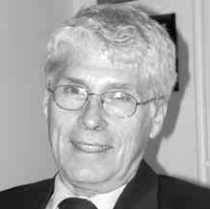 Pour le Dr Gilbert Pinard: « Si la pathologie persiste, elle peut conduire à un divorce, à de multiples conflits exacerbés entre voisins, des membres de la famille ou des proches amis. »
Pour le Dr Gilbert Pinard: « Si la pathologie persiste, elle peut conduire à un divorce, à de multiples conflits exacerbés entre voisins, des membres de la famille ou des proches amis. »